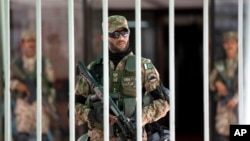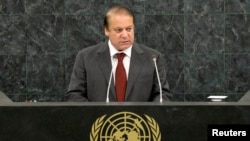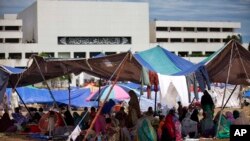Pakistan’s parliament opened an emergency session Tuesday to rally political support for embattled Prime Minister Nawaz Sharif as thousands of protesters continued their agitation just outside the building.
Three weeks of anti-government demonstrations in Islamabad have prompted fears of a military intervention in the coup-prone, nuclear-armed country.
The joint meeting of the National Assembly and Senate took place a day after the prime minister vowed not to resign under pressure.
The prime minister was seated in the house when Interior Minister Chaudhry Nisar Ali told lawmakers that protesters were allowed to stage rallies in the center of the capital to respect their democratic rights. But he said the protesters – armed with sticks, hammers and other tools – have attacked key installations.
"This is not a demonstration, a sit-in or a political gathering," the minister said. "This is a mutiny against state institutions and the state of Pakistan."
Protesters have demanded the prime minister’s resignation and a new election, alleging massive rigging helped the Sharif party win last year.
Parliament sends a message
Federal Minister Ahsan Iqbal spoke to VOA to explain the parliamentary meeting's importance in sending a message to those protesting outside.
The parliament said "miscreants" protesting in Islamabad’s Red Zone should clear out, Iqbal said, noting the legislative body spoke "with one voice."
"There will be no resignation of [the] prime minister because the entire parliament stands united behind the prime minister, so the democracy is going to prevail," he added.
Lawmakers from Sharif-allied parties and opposition groups criticized protesters for resorting to "undemocratic" ways to demand change. Some suggested that elements in the military might have encouraged the anti-government campaign.
But legislators representing the main opposition Pakistan Peoples Party were also critical of Sharif’s handling of the political crisis and issues concerning ordinary Pakistanis since he took charge 14 months ago.
Demonstrations underscore grievance
PPP lawmaker Nafisa Shah spoke to VOA after the special parliamentary session.
“Yes, many of the things that these protesters are saying are unconstitutional, the way in which they are doing it is wrong. But some things that they are saying merit attention,” she said, pointing out that demonstrations had gone on for 19 days. “… So, if they are there, there have to be some grievance and that grievance has to be addressed.”
On Monday, Pakistan's military denied as "baseless" any assertions that it’s behind the twin mass protests to dislodge the Sharif government because of the trial of former army chief, Pervez Musharraf, who was charged with high treason.
The anti-Sharif protests are led separately by cricketer-turned-politician Imran Khan and populist cleric Tahir-ul-Qadri, who also has Canadian nationality.
Addressing his supporters outside parliament, Imran Khan said lawmakers from his party would attend Wednesday’s parliamentary session to respond to allegations he is working against Pakistani democracy with the military’s support.
Kahn said the lawmakers will formally quit the parliament soon after their speeches and this will be their final appearance in the house.






